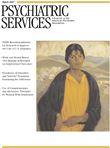Letter
Shared Decision Making and Humanistic Care
In the November Open Forum, Deegan and Drake ( 1 ) make a compelling case to replace the compliance model of medication management with a shared decision-making model that is consistent with person-centered care and evidence-based medicine. There are additional benefits of a shared decision-making model that need mention.
Building a relationship at a deeper and meaningful level with an individual who is in profound psychological distress is professionally very satisfying for psychiatrists. The shared decision-making model helps in building and maintaining such a relationship with clients and can enhance the professional satisfaction of psychiatrists. From clients' perspective, it is extremely affirming to their sense of self to have a physician who respects them as an individual and treats them as an equal partner. Also, the positive and mutually respectful relationship that is the basis of shared decision making is a very good corrective emotional experience for the stigma and discrimination experienced by individuals with psychiatric disabilities, even at the hands of some treatment providers.
However, two factors need to be addressed so that physicians will embrace and practice such a model. The first factor is the lack of training in medical schools about the values inherent in the humanistic approach and person-centered care. Medical training places an undue emphasis on biomedical aspects of client care, generally ignoring psychological and humanistic aspects ( 2 ). Senior clinicians should be good role models in the practical implementation of a shared decision-making model in various clinical settings, such as psychiatric emergency services and inpatient and outpatient settings. However, medical students and residents find that a significant number of their teachers do not practice client-centered care and are not good role models for humanistic care ( 3 ).
A second factor is the focus of the psychiatric field on symptom identification and management, with very little attention to individual functioning, quality of life, and recovery ( 4 ). Most of the funding for research comes from the pharmaceutical industry, and its main focus is evaluating and disseminating information on the efficacy of pharmaceutical strategies. The primary outcome measure in pharmaceutical research trials is symptom reduction or remission, whereas other outcome measures that are more meaningful for clients, such as improvement in functioning, quality of life, and reclamation of lost roles, are not routinely evaluated. Also, there is very limited research on self-initiated, nonpharmaceutical coping strategies (personal medicine) used by clients and on the most effective ways for clinicians to identify and strengthen these strategies. In addition, various payers, such as health maintenance organizations and publicly funded agencies, evaluate the efficacy of pharmacological management on the basis of its ability to reduce symptoms, thereby reinforcing the focus on symptom management.
Medical schools should emphasize teaching and modeling humanistic aspects of providing care. More research is needed to evaluate and strengthen the natural coping abilities of individuals with psychiatric illnesses. The field of psychiatry should also shift its focus from symptoms to factors that are relevant to clients—for example, quality of life and recovery—so that the shared decision-making model of providing care becomes the norm.
1. Deegan PE, Drake RE: Shared decision making and medication management in the recovery process. Psychiatric Services 57:1636–1639, 2006Google Scholar
2. Adams JR, Drake RE: Shared decision-making and evidence-based practice. Community Mental Health Journal 42:87–105, 2006Google Scholar
3. Maheux B, Beaudoin C, Berkson L, et al: Medical faculty as humanistic physicians and teachers: the perceptions of students at innovative and traditional medical schools. Medical Education 34:630–634, 2000Google Scholar
4. Kane JM, Leucht S, Carpenter D, et al: Expert Consensus Guideline Series: optimizing pharmacologic treatment of psychotic disorders: introduction: methods, commentary, and summary. Journal of Clinical Psychiatry, 64(suppl 12):5–19, 2003Google Scholar



